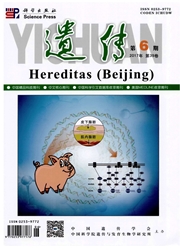

 中文摘要:
中文摘要:
DMRT1、PKCIW和FET1是鸟类性别决定过程中重要的候选基因。以芳香化酶抑制剂处理的鸡胚为实验材料,对这3个基因的表达变化进行了研究。结果表明,在整个性别决定关键时期(E4.5~E10.5),DMRT1在雄性的表达量显著高于雌性,并且在ZW性反转鸡胚中表达大幅上升,表明DMRT1的上调表达是与睾丸形成相关的。PKCIW基因在雌性特异表达并在性反转鸡胚表达上升,这可能与其特殊作用模式有关,即使性反转鸡胚PKCIW代偿性的表达升高,却也未能阻止睾丸的形成。此外,FET1为雌性特异表达,但在性反转鸡胚中表达无变化。综上,实验结果支持了DMRT1是鸟类睾丸发育决定因子的假说。
 英文摘要:
英文摘要:
Dsx and mab-3-related transcription factor (DMRT1), Protein kinase C inhibitor (PKCIW) and Female-specific e.vpression transcription factor (FET1) have been regarded as critical candidates of avian sex determination. Their mRNA expression was analyzed in chicken embryos during experimentally induced female-to-male sex-reversal by an aromatase inhibitor (AI) fadrozole. DMRT1 expression was higher in male (ZZ) gonads than in female (ZW) gonad prior to and throughout the period of sex differentiation. However, female-to-male sex-reversed ZW embryos showed elevated levels of DMRT1 expression similar to those of normal males, indicating that DMRT1 was associated with testis development. PKCIW gene expression was dimorphic between male and female gonads, and was up-regulated in AI-treated female embryos. This fmding might account for the specific effect of PKCIW, functioning via heterodimerization with PKCI during avian sex determination. However, its elevated expression appeared to be insufficient to induce ovary development. On the other hand, FET1 expression was female-specific and unchanged in AI-treated female embryos. Results of present experirnent suggested that DMRT1 is a determinant for testis development in birds.
 同期刊论文项目
同期刊论文项目
 同项目期刊论文
同项目期刊论文
 期刊信息
期刊信息
